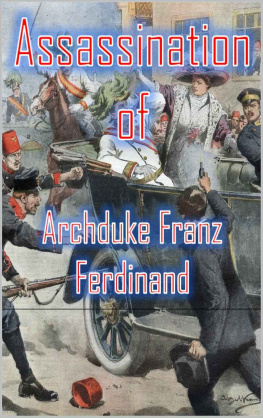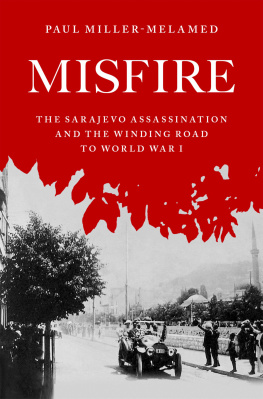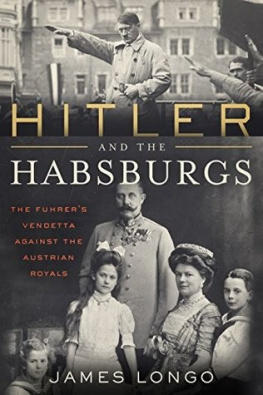Patel - Assassination of Archduke Franz Ferdinand
Here you can read online Patel - Assassination of Archduke Franz Ferdinand full text of the book (entire story) in english for free. Download pdf and epub, get meaning, cover and reviews about this ebook. year: 2021, genre: Romance novel. Description of the work, (preface) as well as reviews are available. Best literature library LitArk.com created for fans of good reading and offers a wide selection of genres:
Romance novel
Science fiction
Adventure
Detective
Science
History
Home and family
Prose
Art
Politics
Computer
Non-fiction
Religion
Business
Children
Humor
Choose a favorite category and find really read worthwhile books. Enjoy immersion in the world of imagination, feel the emotions of the characters or learn something new for yourself, make an fascinating discovery.
- Book:Assassination of Archduke Franz Ferdinand
- Author:
- Genre:
- Year:2021
- Rating:3 / 5
- Favourites:Add to favourites
- Your mark:
- 60
- 1
- 2
- 3
- 4
- 5
Assassination of Archduke Franz Ferdinand: summary, description and annotation
We offer to read an annotation, description, summary or preface (depends on what the author of the book "Assassination of Archduke Franz Ferdinand" wrote himself). If you haven't found the necessary information about the book — write in the comments, we will try to find it.
Patel: author's other books
Who wrote Assassination of Archduke Franz Ferdinand? Find out the surname, the name of the author of the book and a list of all author's works by series.
Assassination of Archduke Franz Ferdinand — read online for free the complete book (whole text) full work
Below is the text of the book, divided by pages. System saving the place of the last page read, allows you to conveniently read the book "Assassination of Archduke Franz Ferdinand" online for free, without having to search again every time where you left off. Put a bookmark, and you can go to the page where you finished reading at any time.
Font size:
Interval:
Bookmark:
Assassination
of
Archduke
Franz
Ferdinand
Index
Chapter 1: Assassination of Archduke Franz Ferdinand
Chapter 2: Preliminaries
2.1 Franz Ferdinand chosen
2.2 Tunnel
2.3 Eve of the attacks
Chapter 3: Assassination
3.1 Bombing
3.2 Town Hall reception
3.3 Fatal shooting
3.4 Funeral
3.5 Aftermath
Chapter 4: Trials and punishment
4.1 Salonika trial (spring 1917)
Chapter 5: Controversy about responsibility
5.1 Rade Malobabi
5.2 "Black Hand" or Serbian military intelligence?
5.3 The newspaper clipping
Chapter 6: Consequences
Chapter 7: History of modern Serbia
7.1 Independence 1878
7.2 19001914
7.3 Serbia in World War I
Chapter 8: History of Serbia since 1918
Chapter 9: Decline and modernization of the Ottoman Empire
9.1 Modernization 18081839
9.2 Greeks, 1820s
9.3 The Auspicious Incident, 1826
9.4 Economy
Chapter 10 : Tanzimat Era 18391876
10.1 18391861 Abdlmecit I
10.2 Identity Card and Ottoman Census, 1844
10.3 Crimean War, 18531856
Chapter 11: Ottoman Constitution, 1876
Chapter 12: First Constitutional Era, 18761878
12.1 Congress of Berlin, 1878
Chapter 13 : Istibdat 1879-1908
13.1 Egypt 1880s
13.2 189396 Ottoman Census
13.3 Reform program
13.4 Armenians
Assassination
of
Archduke Franz Ferdinand
Chapter 1: Assassination of Archduke Franz Ferdinand
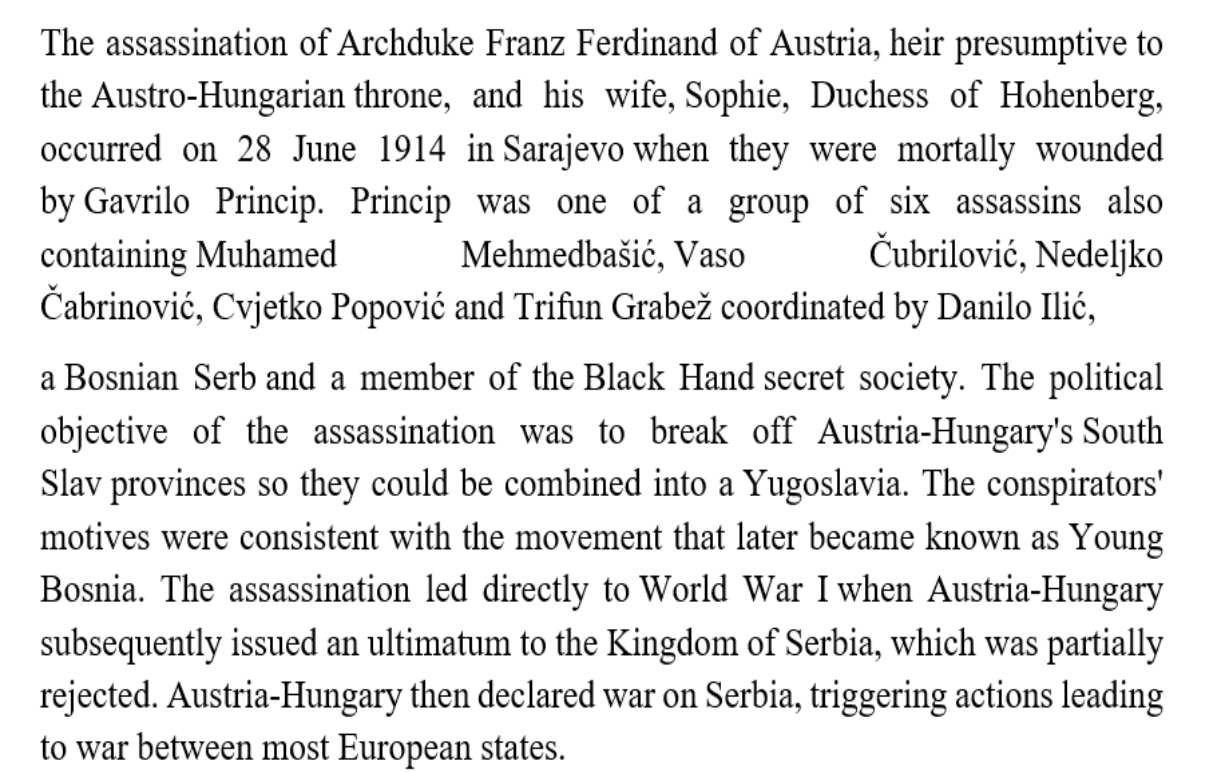
The Serbian military trick was coordinated by Chief of Serbian Military Intelligence Dragutin Dimitrijevi with the help of Major Vojislav Tankosi and spy Rade Malobabi. Tankosi outfitted the professional killers with bombs and guns and prepared them. The professional killers were offered admittance to the very covert organization of safe-houses and specialists that Malobabi utilized for the penetration of weapons and agents into Austria-Hungary.
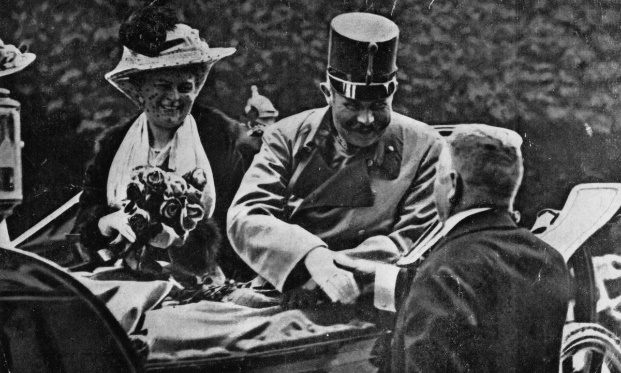
The professional killers, the critical individuals from the surreptitious organization, and the key Serbian military backstabbers who were as yet alive were captured, attempted, sentenced and rebuffed. The individuals who were captured in Bosnia were attempted in Sarajevo in October 1914. Different plotters were captured and attempted under the steady gaze of a Serbian court on the French-controlled Salonika Front in 19161917 on random fraudulent allegations; Serbia executed three of the top military backstabbers. Quite a bit of what is thought about the assassinations comes from these two preliminaries and related records.
While different nations of the previous Yugoslavia to a great extent see Gavrilo Princip as a terrorist, the legislatures of Republika Srpska and Serbia keep on demanding that Princip is a hero.
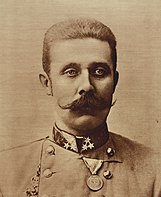
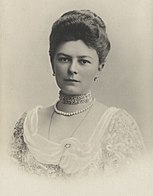
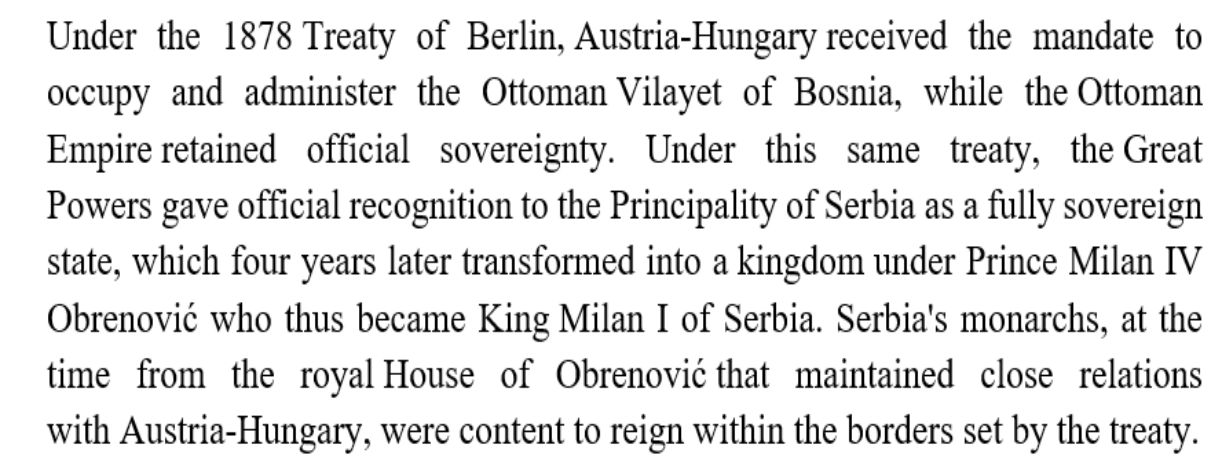
This changed in May 1903, when Serbian military officials drove by Dragutin Dimitrijevi raged the Serbian Royal Palace. After a savage fight in obscurity, the aggressors caught General Laza Petrovi, top of the Palace Guard, and constrained him to uncover the concealing spot of King Alexander I Obrenovi and his significant other Queen Draga. The King was therefore shot multiple times and the Queen eighteen. MacKenzie composes that "the regal cadavers were then stripped and mercilessly sabred." The assailants tossed the bodies of King Alexander and Queen Draga out of a castle window, finishing any danger that followers would mount a counterattack." General Petrovi was then executed when Vojislav Tankosi coordinated the homicides of Queen Draga's brothers. The plotters introduced Peter I of the House of Karaorevi as the new king.
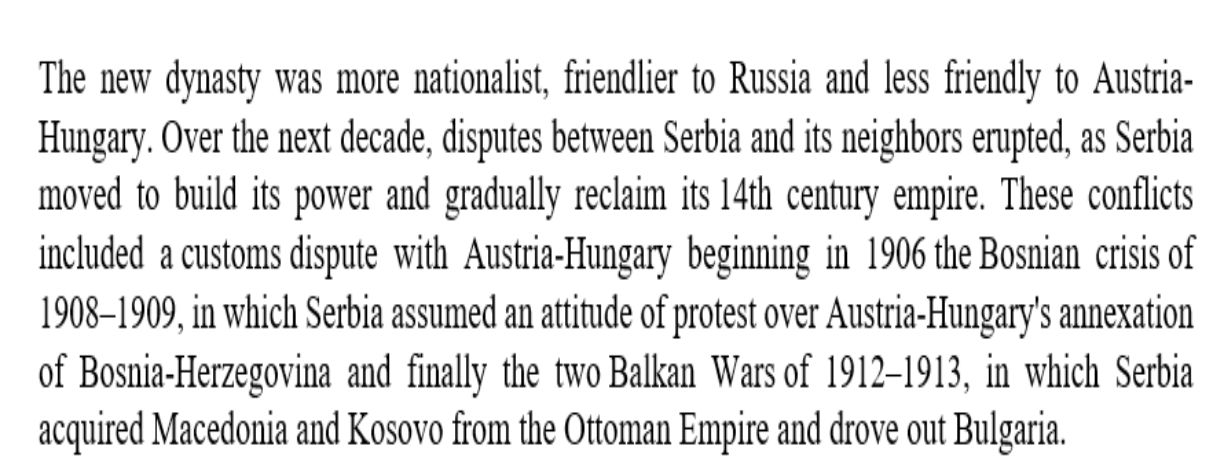
Serbia's military victories and Serbian shock over the Austro-Hungarian extension of Bosnia-Herzegovina encouraged Serbian patriots in Serbia and Serbs in Austria-Hungary who scraped under Austro-Hungarian principle and whose patriot conclusions were blended by Serb "social" organizations. One remarkable model was a Serbian patriot society Narodna Odbrana, which was shaped in Belgrade on 8 October 1908 under the activity of Milovan Milovanovi. Under the pretense of social exercises, it worked to subvert the devotion of Serbs in Austria-Hungary to the Habsburg regime. In the five years paving the way to 1914, solitary professional killers generally Serb residents of Austria-Hungary made a progression of fruitless assassination endeavors in Croatia and Bosnia-Herzegovina against Austro-Hungarian officials. In Bosnia-Herzegovina, there existed a neighborhood progressive development known as Young Bosnia, whose objective was the disintegration of Austria-Hungary.
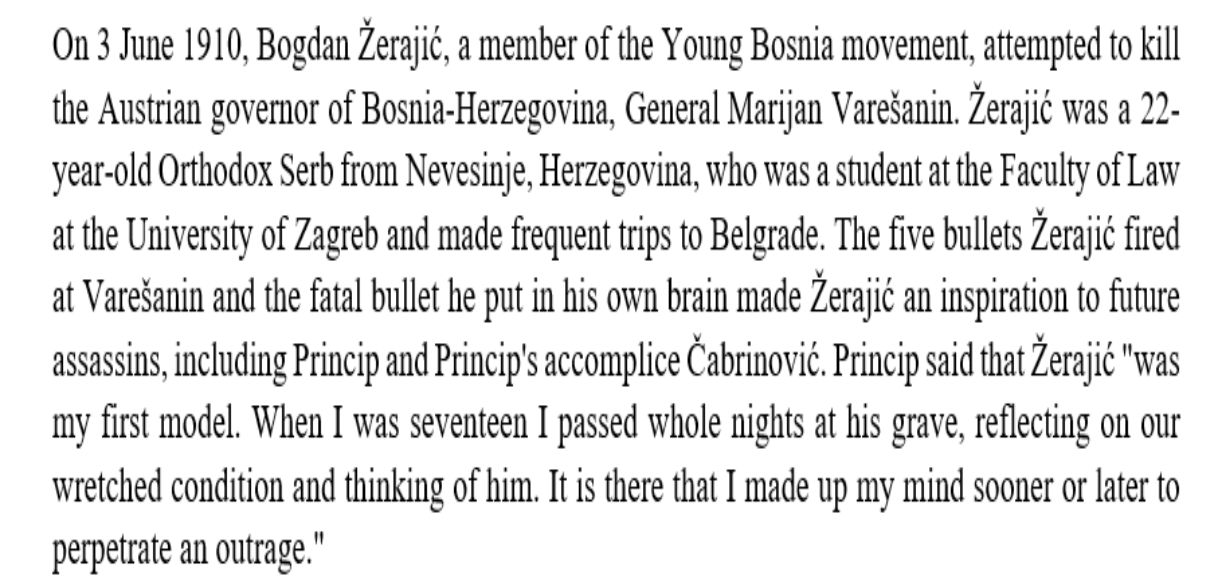
In May 1911, the Black Hand, a mystery society committed to making a Greater Serbia through "fear monger activity", was set up by key individuals from the Narodna Odbrana including Dimitrijevi and Tankosi. Within Bosnia-Herzegovina, the organizations of both the Black Hand and Narodna Odbrana infiltrated neighborhood progressive developments, for example, Young Bosnia.
In 1913, Emperor Franz Joseph told Archduke Franz Ferdinand to notice the military moves in Bosnia booked for June 1914. Following the moves, Ferdinand and his significant other wanted to visit Sarajevo to open the state gallery in its new premises there. Duchess Sophie, as per their oldest child, Duke Maximilian, went with her better half out of dread for his safety.
As Sophie, despite the fact that of high refined birth, was not from a dynastic family, her association with the Habsburg beneficiary hypothetical must be a morganatic marriage. Sovereign Franz Joseph had just agreed to their marriage depending on the prerequisite that their relatives could never climb the seat. The fourteenth commemoration of their marriage fell on 28 June. As antiquarian A. J. P. Taylor notices:
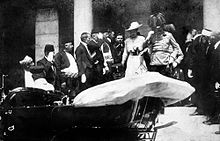
would never share Franz Ferdinand's rank ... would never share his qualities, would never at any point sit close by on any open event. There was one proviso ... his significant other could appreciate the acknowledgment of his rank when he was acting in a military limit. Henceforth, he chose, in 1914, to assess the military in Bosnia. There, at its capital Sarajevo, the Archduke and his significant other could ride in an open carriage one next to the other ... Along these lines, for affection, did the Archduke go to his death.
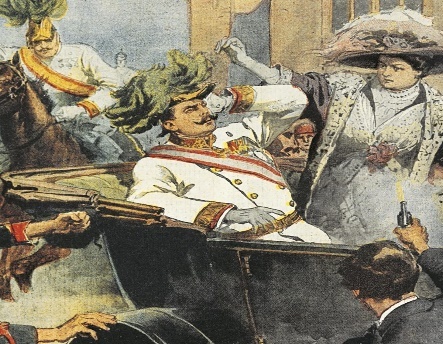
Franz Ferdinand was a supporter of expanded federalism and generally accepted to support trialism, under which Austria-Hungary would be rearranged by consolidating the Slavic grounds inside the Austro-Hungarian realm into a third crown. A Slavic realm might have been a rampart against Serb irredentism, and Franz Ferdinand was hence seen as a danger by those equivalent irredentists. Princip later expressed to the court that forestalling Franz Ferdinand's arranged changes was one of his motivations.
Font size:
Interval:
Bookmark:
Similar books «Assassination of Archduke Franz Ferdinand»
Look at similar books to Assassination of Archduke Franz Ferdinand. We have selected literature similar in name and meaning in the hope of providing readers with more options to find new, interesting, not yet read works.
Discussion, reviews of the book Assassination of Archduke Franz Ferdinand and just readers' own opinions. Leave your comments, write what you think about the work, its meaning or the main characters. Specify what exactly you liked and what you didn't like, and why you think so.

